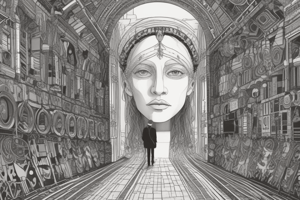Podcast
Questions and Answers
What is society?
What is society?
A group of people living together in a particular place or at a particular time and having many things in common.
What does it mean when we say society is sui generis?
What does it mean when we say society is sui generis?
It means society is unique or can be examined as an object.
Which of the following components make up society?
Which of the following components make up society?
- Culture
- Working class
- Ethnicity
- All of the above (correct)
According to Karl Marx, what is social conflict?
According to Karl Marx, what is social conflict?
What do capitalists do?
What do capitalists do?
What is the proletariat?
What is the proletariat?
Match the following terms with their definitions:
Match the following terms with their definitions:
Marx believed that history is a history of class struggle.
Marx believed that history is a history of class struggle.
What is class consciousness according to Marx?
What is class consciousness according to Marx?
What leads to alienation in capitalism according to Marx?
What leads to alienation in capitalism according to Marx?
Study Notes
Understanding Society
- Society is defined as a group of individuals sharing commonalities, residing in the same location or time.
- Analogy: Society is akin to an object that can be examined and analyzed, similar to biological or geological study.
- Components of society include culture, working class, and ethnicity, each presenting complexities that challenge societal study.
Sociocultural Evolution
- Societal evolution encompasses biological and cultural changes from early to modern humans.
- Interpretation of human material remains and artefacts is vital for understanding cultural, social, political, and economic processes.
- National, local, and specialized museums, as well as archaeological sites, provide insights into biocultural and social evolution.
Perspectives on Social Change
- Karl Marx's perspective emphasizes conflict in society, framed as a struggle over valued resources.
- Key concepts in Marxism:
- Capitalists: Individuals owning and managing production businesses.
- Proletariat: Workers exchanging labor for wages.
- Infrastructure: Represents the economic foundation of society.
- Superstructure: Encompasses institutions like family, religion, and politics.
Class Struggle and Consciousness
- History is characterized by class struggle, a conflict between classes regarding wealth and power distribution.
- False consciousness: Marx's critique of attributing social issues to individual failings rather than systemic flaws.
- Class consciousness: The realization among workers of their collective identity in opposition to capitalists, leading to the potential for a socialist revolution.
Alienation in Capitalism
- Alienation refers to feelings of isolation and distress arising from powerlessness within a societal structure.
- Workers experience alienation in four primary ways, reflecting the disconnection from the act of work and the larger societal framework.
Studying That Suits You
Use AI to generate personalized quizzes and flashcards to suit your learning preferences.
Related Documents
Description
This quiz explores the foundational concepts of sociology, emphasizing the definitions and components of society. It further delves into theories of sociocultural evolution and perspectives on social change, particularly focusing on Marxism. Test your knowledge on how society evolves and the impact of culture, ethnicity, and class within it.




